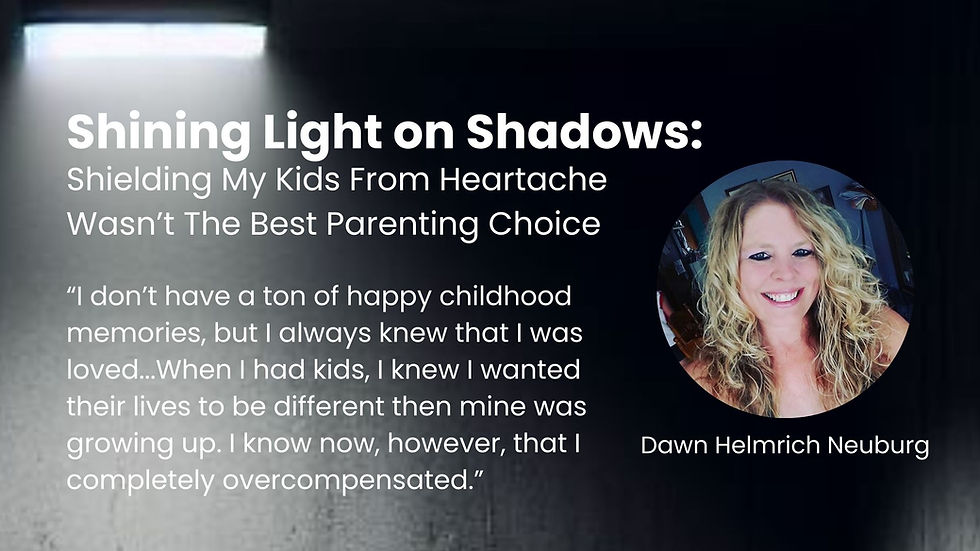Working for the National Alliance on Mental Illness is Personal
- Michael Wood

- Aug 11, 2025
- 4 min read
Updated: Aug 27, 2025

Editor's Note: This blog post was originally published by Michael Wood as "My Why" for a National Alliance on Mental Illness newsletter in February 2025. A more detailed version was published on Medium, in August 2024, before Michael applied for the job at NAMI.
At the expense of sounding corny, when I saw the job posting for NAMI’s next Chief Operating Officer, it felt like I was being called. By what, or whom, I can’t say. But I felt something—something I hadn’t felt in nearly 25 years of nonprofit work.
I have had the good fortune of helping to scale impact and change at some of the nation’s largest nonprofits—United Way Worldwide, March of Dimes and most recently, the Spina Bifida Association. All fantastic organizations doing important work I believe in to improve the lives of people I care about.
But for me, the work of NAMI is different. It’s personal.
I will be the guest on a show hosted by Neil Parekh and Dawn Helmrich Neuburg, “Shining Light on Shadows: A Candid Conversation About Mental Health.” Ep. 34 will be livestreamed Thursday, August 14 at 7pm ET / 6pm ET. We will be focusing on parenting after childhood trauma. You can watch the live show or recording on Facebook, Twitter*, LinkedIn, YouTube or Instagram*.
*We won't know the exact urls for Twitter or Instagram until we go live on Thursday. For now, these links go to Neil's Twitter and Instagram.
If you click on the social media links above, and comment during the live show, they show your comments on the screen during the livestream. You can also just watch the recording or live show right below.
As someone who grew up in the coalfields of southern West Virginia, I’ve seen first-hand what happens when people don’t have access to quality, affordable mental health care. I know because I come from a home with parents who suffered from mental health challenges that weren’t properly treated.
My father was abandoned by his own father as a baby, and when my grandmother remarried, instead of being embraced, he was often passed around to extended family. His solution to dealing with that trauma was to numb his pain with alcohol, which often led to verbal and even physical abuse.
I have no early childhood memories of hugs, or being read bedtime stories, or even being told, “I love you.” Instead, what I remember are things like Mom being shoved to the ground or hit across the face, food being thrown against the wall, hiding in my bedroom in fear, and lots of cursing, yelling, and crying.
Mom herself struggled with mental health issues, which also led her to numb her pain. In her case, though, the numbing agents of choice were pills.
She eventually was diagnosed with bipolar disorder but never really received quality care. She’d go into the doctor’s office, and he’d ask her how she was doing. She’d say, “fine,” and she’d get her prescriptions. It was like moving patients through an assembly line.
I dealt with the trauma at home by hiding it away. I have many memories of wiping tears out of my eyes before going to school, putting on a smile, and acting like everything was fine. I never had a single person over for a sleepover out of fear that someone would find out.
As I started my own family, I could see Mom’s substance abuse was worsening. No matter what I tried to do to help her, nothing changed. Mom eventually died at home, alone, from an accidental overdose. She was only 57 years old.
My oldest brother, himself struggling with mental health issues and substance abuse, took Mom’s death especially hard. It was only 13 months later that he, too, died from an accidental overdose. He was 35 and left behind a wife and a 12-year-old son.
Dad went downhill after all of this and a few short years later, had a major stroke that forced him into retirement. I became his primary caretaker until he passed in 2023. I tried to get him into therapy, but he didn’t stick with it. I think it was just too hard for him.
Despite it all, Mom loved us unconditionally and was always there for us. And while Dad’s drinking could turn him into a monster, he also did a lot of things right. My big brother was also one of the gentlest, kindest people I ever knew. I miss them terribly every single day.
So yes, I felt called to NAMI. I took this job because I want to be part of building a world where no one suffers from a lack of good care like those in my family did. They were all good people who simply needed help. They all deserved better.
They are my “Why.”
I’m telling this story because I want you all to understand that when I say I get it, I really mean it. I’m committed to doing everything I can to make sure our national office provides world-class support to all its Alliance members. Because that’s where we’re improving and even saving lives—on the ground, in communities, one person at a time. You are my heroes.
Thank you for all you do.






Comments